At least in Romania, where about $34 will get you 1,000,000 Lei. Of course, thanks to inflation, this isn't really worth much. Romania is in the process of revaluing it's currency (AKA, dropping the last 4 zeros off of all the money) and all the prices are listed in both the old and new versions. I kind of like the old version, though, because I feel like I have a lot of cash.
 I'm in northern Romania to see some monasteries. Painted ones that are unique to the area and that made it onto UNESCO's World Heritage List.
I'm in northern Romania to see some monasteries. Painted ones that are unique to the area and that made it onto UNESCO's World Heritage List.Unfortunately, seeing them would not be as easy as I'd thought.
Hiding from the rain that has flooded most of central Romania in a rented room in Gora Humoruli (a tiny town that is the closest bit of civilization to the monasteries) I realized I could have planned this a bit better.
And by that I mean I should have done some planning.
Problem #1: The Language Barrier
I came to Romania thinking that language would not be a problem. I am comfortable using three lingua francas (English, Spanish and Russian), and, if someone I met knew none of these, I knew that Romanian was a Romance language. Because I know Spanish, I am, to some extent, able to understand Portuguese and Italian, so I thought that I would be able to get the gist of something said in Romanian.
Wrong.
At both bus and train stations, I met attendants who spoke none of the languages I did and who became agitated and rude the second they realized that I didn't know Romanian. As they waved me away in a torrent of words so that they could attend to the people behind me, I realized that Romanian is just close enough to Spanish to be familiar while still being completely impenetrable. Hearing it, I was thinking: "okay, I feel like this should make sense to me, but I don't understand a goddamn word you're saying."
Wrong.
At both bus and train stations, I met attendants who spoke none of the languages I did and who became agitated and rude the second they realized that I didn't know Romanian. As they waved me away in a torrent of words so that they could attend to the people behind me, I realized that Romanian is just close enough to Spanish to be familiar while still being completely impenetrable. Hearing it, I was thinking: "okay, I feel like this should make sense to me, but I don't understand a goddamn word you're saying."
Problem #2: Transportation
Since I couldn't get any information out of any of the attendants about travel options, I finally had to find a bus to Gora Humoruli by looking at signs in bus windows. When I finally found one, I was ripped off by the driver. I gave him 100,000 Lei for a 45,000 ticket, and in return he gave me a 5,000 Lei coin and communicated through gestures said he would give me the change when he had it. Simple enough; happens all the time.
When we arrived at Gora Humorului and I asked for my change (using Russian, since he seemed to be getting the gist from that), he waved me off and acted as if he didn't understand me. The money was a pittance, but it still annoyed me.
In the town itself, I realized that there was no identifiable public transportation. Mostly, what I saw were horse drawn carts. Unable to communicate and unable to find how to get around, making it to the monasteries suddenly seemed impossible. I felt angry, isolated and vulnerable. I know I like to think of myself as this great traveler, but sometimes reality likes to sit me down and smack me in the face.
With the rain coming down, and little idea what to do, I started searching for a place to sleep.
In the town itself, I realized that there was no identifiable public transportation. Mostly, what I saw were horse drawn carts. Unable to communicate and unable to find how to get around, making it to the monasteries suddenly seemed impossible. I felt angry, isolated and vulnerable. I know I like to think of myself as this great traveler, but sometimes reality likes to sit me down and smack me in the face.
With the rain coming down, and little idea what to do, I started searching for a place to sleep.
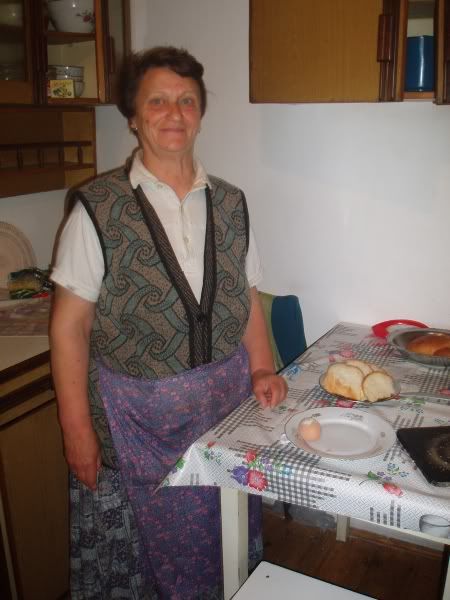
Salvation came from a woman named Maria, a sweet woman in her 50s who had a sign in the window of her tiny house that simply said "Room".
She answered the door and, it turned out, had learned some Russian in grade school. She invited me inside, her watery-eyed, thirty-year daughter sitting at the table and staring at me the way that girl from the exorcist probably would, and we negotiated a price.
After a while, we got to the reason I was in Romania. No, she said, there were no buses to the monasteries.
But, she went on when she saw my crestfallen face, I could hitchhike.
My First Ever Hitchhike
I'd never hitchhiked, before, and I'll admit I was a little nervous as I set out down the dirt road towards the monasteries with a three hard-boiled eggs, two bananas, a few slices of bread and a bottle of water in my satchel. Images of of being stabbed to death and my mother's horrified face circled in my head as I stuck out my hand at the first car that came by.
I was surprised when it immediately stopped. The driver, a slightly balding man in his late 20s, didn't speak English, Russian or Spanish, but understood where I wanted to go. As we silently trundled down the road, I wondered if it was proper to pay for the ride, and debated how much I should give and how I should do it. He dropped me off 100 meters from one of the monasteries, refused the money that I tried handing him with a smile and drove off.
That really brightened my day. I had resigned myself to the fact that most Romanians were rude, and here was this stranger, paying me a kindness.
I was surprised when it immediately stopped. The driver, a slightly balding man in his late 20s, didn't speak English, Russian or Spanish, but understood where I wanted to go. As we silently trundled down the road, I wondered if it was proper to pay for the ride, and debated how much I should give and how I should do it. He dropped me off 100 meters from one of the monasteries, refused the money that I tried handing him with a smile and drove off.
That really brightened my day. I had resigned myself to the fact that most Romanians were rude, and here was this stranger, paying me a kindness.
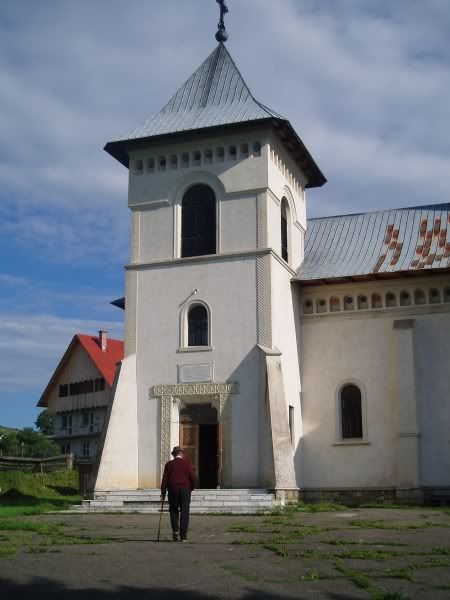 Humor
HumorI could see one of the monastariesfrescos on the wall and watching the Sunday service being conducted. Orthodox services are interesting to me: people are expected to stand, and there were no pews. High-backed carved wooden chairs lined the walls for the older attendees, but to be honest, all the attendees were older, none younger than fifty. They sat hunched in the chairs while a priest, unseen behind a wooden wall adorned with icons, chanted in Latin in a call-and-response with another priest who stood on my side of the wooden wall, chanting back. The elderly people walked around the interior of the church, kissing icons and crossing themselves. I felt a little sad that there were no younger people there, that religion was simply relegated to the old.
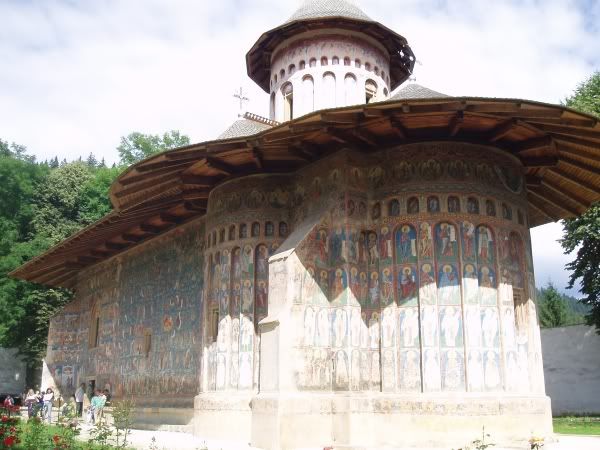 The monastary, which was next door, was amazing. Called Humor (Gora Humorului means "the mouth of Humor"), it was built in 1530. Small, round, with a pointed roof and enclosed within a protective wall, what landed it--and the other nearby monestaries--on UNESCO's list are the paintings on its exterior walls. I could see how the paintings had weathered over the years, those near the top and under the eve of the roof being better preserved than those near the bottom that were exposed to centuries of rain. Most of the paintings at the very bottom had faded past recognition.
The monastary, which was next door, was amazing. Called Humor (Gora Humorului means "the mouth of Humor"), it was built in 1530. Small, round, with a pointed roof and enclosed within a protective wall, what landed it--and the other nearby monestaries--on UNESCO's list are the paintings on its exterior walls. I could see how the paintings had weathered over the years, those near the top and under the eve of the roof being better preserved than those near the bottom that were exposed to centuries of rain. Most of the paintings at the very bottom had faded past recognition. The art was theoretically Byzantine, but it definitely had a style of its own. What the artist had done, which I had never seen in other religious art, was break the walls into rectangles, almost like a giant comic book, each frame holding a different saint or scene from the bible. Inside, nuns wearing habits chanted in Latin to a congregation of the elderly, who stood and crossed themselves.

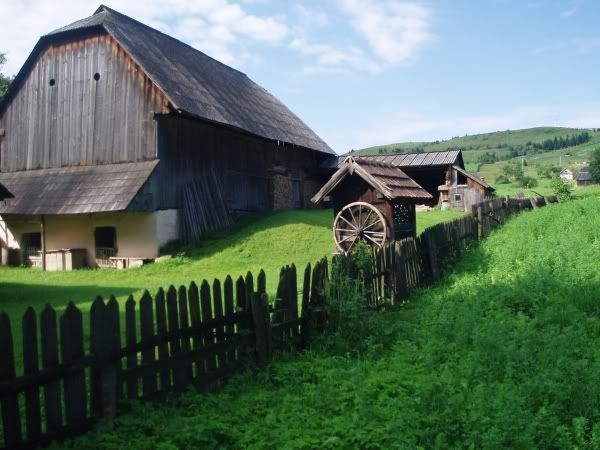 I hitchhiked back. Once again, the first car that passed me stopped, and although there were four people in the little car, they moved to make room for me. The rain had given way to a beautiful summer afternoon, and pressed against the window I was treated to open fields with grazing horses, Romanian houses with roofs tiled in wood or covered in tin, and past freely-wandering cows and chickens. When we arrived back in Gura Humorului, everyone but the driver got out. The man sitting beside me handed the driver 10,000 Lei, so I thought that was expected of me, too. I handed the driver the money, but he looked confused. Finally, though, he just kept it and drove off.
I hitchhiked back. Once again, the first car that passed me stopped, and although there were four people in the little car, they moved to make room for me. The rain had given way to a beautiful summer afternoon, and pressed against the window I was treated to open fields with grazing horses, Romanian houses with roofs tiled in wood or covered in tin, and past freely-wandering cows and chickens. When we arrived back in Gura Humorului, everyone but the driver got out. The man sitting beside me handed the driver 10,000 Lei, so I thought that was expected of me, too. I handed the driver the money, but he looked confused. Finally, though, he just kept it and drove off.Voronet
I hiked across town and down another road that I knew led to another monastery. This time a Romanian couple in a motor home picked me up. They had been living in Germany for 25 years they told me in English, and had come back to see their home country for the first time in a quarter-century.

They dropped me off at Voronet, a monastery built in 1488. Larger than Humor and crowded with worshippers, Voronet is famous for the color of blue that is the background of all its exterior paintings. Apparently this shade of blue is found only at Voronet ("being unique in the world like Rubens' red and Veroneses's green" said my guidebook) and they're having trouble restoring the faded murals because they don't know how to reproduce the paint. Dominating the western wall of this monastery was a painting of The Last Judgement: it was the book of Revelations in graphic novel form, including the rising of the Leviathan, the battle between good and evil, and all the people of the world being judged by God, compressed into one, huge painting. One thing I saw in the painting that I'd seen in no other Last Judgements: God sitting on a scroll unfurled by angels, the scroll obviously representing the heavens. What was on this scroll, though, were representations of the Zodiac: Pisces and Sagittarius and Cancer and so on. I hadn't known these symbols to ever be included in a Christian painting before.
I could barely see the interior of the monastery because it was packed with worshippers. Most were kneeling and crossing themselves, taking up every square inch of floor space, crowding into the tiny stone rooms and kneeling three abreast in the tiny stone archways, listening to a man chanting from a place I couldn't see. It was all I could do to duck my head in, and when I did, I got a couple of angry looks from those who were kneeling there. I wanted to take a photo of this carpet of people pressed into this ancient monetary, but I thought someone would probably throw something at me, so I left.
Once again, I hitchhiked back into town, being picked up by a Romanian man who just nodded at me as I got in and then flew down the road, leaning on the horn whenever a pedestrian got too close to his car. The man didn't ask for payment and I didn't offer. Actually, we didn't say a word to each other the whole ten-minute trip. We shook hands when I got out of the car, and he immediately took off. I was really happy about all this successful hitchhiking. It seems that in Romania it's just customary to pick up anyone who wants a ride, provided they're headed your way.
I assume that without regular buses to move people around, those with cars just fill in the void. Sad that I couldn't see something similar happening in America. It's a shame that paranoia prevents us from doing that. What was once common has been legislated and media-fear inundated almost out of existence. Don't pick someone up! They'll rob you or rape you! And maybe so, but it's unlikely. More likely to get robbed or raped just walking down the street. To Romanians, it seems that if someone needs a lift, why not give it to them? I like that. It probably wouldn't be a bad idea to hitchhike around the rest of the country, but I've also been programmed to fear getting robbed or raped and so, despite everything I just said, was too leery to trust it. A couple miles down a country road into town in daylight is one thing, but anything else and I could hear my mother yelling at me.
Sigh.
I assume that without regular buses to move people around, those with cars just fill in the void. Sad that I couldn't see something similar happening in America. It's a shame that paranoia prevents us from doing that. What was once common has been legislated and media-fear inundated almost out of existence. Don't pick someone up! They'll rob you or rape you! And maybe so, but it's unlikely. More likely to get robbed or raped just walking down the street. To Romanians, it seems that if someone needs a lift, why not give it to them? I like that. It probably wouldn't be a bad idea to hitchhike around the rest of the country, but I've also been programmed to fear getting robbed or raped and so, despite everything I just said, was too leery to trust it. A couple miles down a country road into town in daylight is one thing, but anything else and I could hear my mother yelling at me.
Sigh.
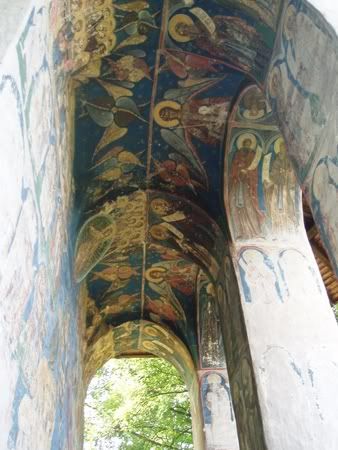
No comments:
Post a Comment